The Baroness and the Butler

Brief Synopsis
Cast & Crew
Walter Lang
William Powell
Annabella
Helen Westley
Henry Stephenson
Joseph Schildkraut
Film Details
Technical Specs

Synopsis
On the last day of the Hungarian parliamentary elections, impeccable butler Johann Porok serves his master, Count Albert Sandor, the Prime Minister of Hungary, with his usual precision. Later in the day, after the polls close, Sandor and his family, which consists of his wife, the Countess, his snobbish daughter, the Baroness Katrina Marissey, and her philandering husband, Baron Georg Marissey, are astonished to hear on the radio that Johann has been elected to the parliament on the social progressive ticket, which strongly opposes Sandor. The stately prime minister takes the news in stride after Johann assures him that his new position will not interfere with his devotion as a butler, and in a radio broadcast, Sandor thanks his constituents for re-electing him and introduces Johann. Johann speaks strongly against Sandor's empty promises and ineffectual policies, which shocks the rest of the family but amuses Sandor. As time passes, Johann's eloquency in parliament draws quite a following, especially of admiring women, and Katrina finally goes to hear him speak. She is outraged by his defiance of her father's policies, as is the countess when she attends with Katrina later. Katrina even throws her purse at Johann as he is speaking, and when a brawl starts among the parliament members, Johann proves his sense of duty by escorting Sandor out of the hall. Later that afternoon, Georg informs the family that after Sandor left, a vote of confidence was taken and Sandor was removed as prime minister. Katrina sharply accuses Georg of not defending his father-in-law strongly enough, but Georg, who is trying to further his own career regardless of who is hurt, fends off her remarks by saying that a coalition cabinet has long been in the works. After Georg leaves, Katrina turns on Johann, reprimanding him for attacking her father. Johann explains that while he regards Sandor highly as a person, he feels he is an incompetent politician. Their conversation makes Johann late in attending Sandor, and Sandor reluctantly fires Johann for being lax in his service. Johann understands that the action is not related to their political opposition and calmly leaves the house he has lived in all of his life. Later, Katrina and Georg host a ball to impress Georg's political higher-ups, and Georg mockingly invites Johann. Katrina is at first outraged to have to receive a former servant as her guest, but as the pair talk alone, they reminisce about their lives together. He tells her of his dreams, both political and personal, and confesses that all of his drive for self-education and social betterment is due to his deep love for her. His admission stirs Katrina, and as they are kissing, Georg walks in. The next day, Georg's lack of violent reaction is explained when Sandor announces to Katrina that Georg has consented to give her a divorce if Johann's party endorses him for Minister of Commerce in the coalition, and if Johann retires from politics. Katrina, who now believes in Johann, rushes to the parliament building to prevent him from nominating Georg. At Johann's office, she tries to talk him out of committing political suicide, but he insists that he must avoid any scandal for her sake. He goes out on the floor, and as he announces Georg's nomination, Katrina interrupts him. In front of the entire audience, Katerina explains that she and Johann are in love and that Georg is blackmailing them to get the nomination. Her declaration moves the politicians, and Georg is booed out of the hall, while Johann is elected to the post. Soon after, Katrina happily serves her new husband, Johann, breakfast in bed.

Director

Walter Lang
Cast

William Powell

Annabella

Helen Westley
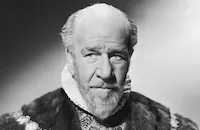
Henry Stephenson
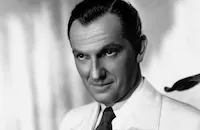
Joseph Schildkraut

J. Edward Bromberg
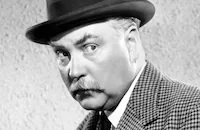
Nigel Bruce
Lynn Bari
Maurice Cass

Ivan Simpson

Alphonse Ethier
Claire Dubrey

Wilfrid Lucas
Sidney Bracy
Frank Baker
Eleanor Wesselhoeft
George Davis
Margaret Irving
Paul Mcvey
Ruth Peterson
John Bleifer
Edward Cooper
Lowden Adams
Denis D'auburn
Burr Caruth
Antonio Filauri
Bert Sprotte
Glen Cavender
Tom Ricketts
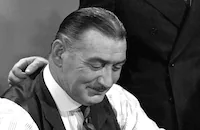
Edward Keane
Alex Pollard
William Sabbot
Jack Vlaskin
Esther Brodelet
Lucille Miller
Inez Palange
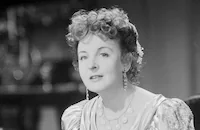
Doris Lloyd
Charlotte Wynters
Iva Stewart
Crew
Melville Baker
Harry Brand
L. Brown
Alfred Bruzlin
Gene Bryant
Constance Collier
Raymond Griffith
Sam Hellman
Roger Heman
Bernard Herzbrun
Joseph Lashelle
Thomas Little
Paul Lockwood
George Marion Jr.
Barbara Mclean
Arthur Miller
Hans Peters
Robert Planck
Allen Rivkin
Kathryn Scola
Louis Silvers
Lamar Trotti
Gwen Wakeling
Darryl F. Zanuck

Videos
Movie Clip



Film Details
Technical Specs

Articles
The Baroness and the Butler
On screen, that is. No man is ever really so unmoved. And in 1938, the off-screen William Powell was in personal and professional turmoil. The love of his life, Jean Harlow, died tragically of renal failure at the age of 26. Still reeling from grief at this loss, Powell found his contract at MGM, the studio that practically made him a star, over. He was adrift, in more ways than one-but he would be called on to put on a happy face for the cameras to play opposite French actress Annabella in her American debut for a one-off romantic comedy made at 20th Century Fox. Almost immediately after completing the film, Powell would be diagnosed with cancer, and spend most of the next two years fighting for his life. That the film in question is even watchable, given such conditions, is a testament to Powell's professionalism.
It was an adaptation of the 1936 Viennese play Jean (a surprising number of Hollywood's romantic comedies in that period came from Austrian and Hungarian theatre). The play had already migrated to Broadway in 1937, where it took the title The Lady Has a Heart and accommodated Vincent Price in the role now destined to be Powell's. That role was Jean, the title character. A note appended to the first screenplay treatment in the studio files indicates that the Fox writing staff were already eyeing another title change: "Jean is a rather Frenchy name and is interchangeably masculine and feminine." Studio chief Darryl Zanuck decided on the new title: The Baroness and the Butler (1938).
The play had obviously been selected on the basis of its thematic similarity to Powell's Oscar®-nominated blockbuster hit My Man Godfrey (1936). Again, Powell is cast as a butler in a situation that turns on the Depression-era gap between the Haves and the Have Nots, although this time the action was relocated to a fantasy vision of Hungary, full of faux-European opulence.
Mixing class-warfare and progressive rabble-rousing with romantic comedies sounds like a dangerous concoction, and one cannot easily imagine the studio moguls in the late 1930s taking such stuff lightly. But the more audiences responded positively to these socially-minded farces, the more Hollywood would keep making them-and William Powell's brilliance in Godfrey, one of the most prominent of the sub-genre, made him an obvious go-to choice for anyone seeking to replicate that formula. He was even in contention to play the male lead in Ernst Lubitsch's Ninotchka (1939), a role that went to Melvyn Douglas when Powell's cancer-related troubles sidelined him for a few years.
Director Walter Lang had worked his way up the ranks during the silent era. By 1926 he was directing movies-and then he decided to give it up. Lang took a brief hiatus from that career to try his hand at being an expatriate painter in Paris. He soon slunk back to Hollywood with his tail between his legs to resume making comedies, such as the superlative Carole Lombard vehicle Hands Across the Table (1935). By the 1940s and 50s he settled into making lavish Technicolor musicals, of which his last was the mildly unfortunate 1961 swan song Snow White and the Three Stooges (not an unbearably bad movie, but likely not how the director of The King and I (1956) and Desk Set (1957) would like to be remembered).
The production supervisor on the film was another old hand at comedy, Raymond Griffith. In the 1920s, Griffith was a screen clown whose comedies confidently bore comparison to those of Buster Keaton and Charley Chase. However, his acting career had effectively ended by 1927. Any thoughts he may have harbored about trying for a comeback ended as sound rolled in, his weak raspy voice being unfit for talking pictures. He started anew, as a production supervisor, and served in that administrative capacity for many happy years.
As directed by Walter Lang, The Baroness and the Butler opens by introducing not its characters but its settings-three places, each as significant to the plot as any of the humans who live there. The first is the Hungarian Parliament in Budapest, where the rulers rule. Second is the town of Tura, where the ruled live in poverty. Last is Castle Sandor, where the rulers live in prosperity. Then, and only then, is it time to introduce William Powell as Jean, now renamed Johann, the butler to the Prime Minister, Count Sandor (Henry Stephenson). Theirs is a warm relationship: Sandor is a generous old man with a big heart, and his servant seems to genuinely love him. But it is a professional relationship, demarcated by clear class boundaries and strict rules. It may appear to be a form of friendship, but it is a friendship in which one man is forbidden to sit in the presence of the other, all but banned from speaking at all.
So, when it comes to pass that Johann has been elected to serve as a Senator representing the socially progressive opposition party, this relationship is put to the test....well, sort of.
The odd thing about this movie, the thing that keeps it from being great while at the same time providing its main source of interest, is that the improbable central premise is only a loony high-concept on top of which the filmmakers stretch out an even nuttier and less plausible set of additional circumstances.
At Parliament, Johann is a sharp-tongued activist with a take-no-prisoners opposition to Sandor; but he retains his position as butler. The tensions multiply in every direction: these two men admire and respect each other, yet are political foes. And even that respect between them is a source of tension-Sandor's gentle demeanor makes him a beloved public figure, yet he advances regressive and selfish policies for the moneyed set. Johann needs to destroy his master's public image to make any social change. Meanwhile, Sandor agrees with Johann's policies, yet does nothing to help him, and rankles that his butler's public responsibilities are distracting him from his private duties. The Sandor family practically explode with fury at the betrayal, and are horrified to have to think of their butler now as something of a social equal . . . and did I mention this is a romantic comedy?
The romance angle comes from Annabella, as the PM's daughter Katrina. As long as Johann was unambiguously her servant, she flirted with him constantly. Now that he has all these uppity ideas above his station, she sets out to ruin him-but this being a 1930s rom-com, her surface hostility masks a hidden tenderness. In the age of the screwball, combat is courtship.
The Baroness and the Butler doesn't really work, not the way its makers probably intended. It's hard to swallow a serious political message from something so scattershot and farcical, yet it's equally hard to lose yourself in the comic complications when everyone keeps making political speeches. Throughout it all, Powell gives a terrific performance. Whatever was burning away inside him, he appears to be his usual imperturbable self, adroitly juggling the conflicting moods of the crazy plot. Annabella fares less well-her thick French accent and haughty demeanor are appropriate for her character but get in the way of the necessary sexual chemistry she's supposed to be kindling with Powell. One is cool as a cucumber, one is ice-cold, and the combination isn't entirely inviting.
The relationship between Powell and Stephenson is another matter entirely. Here is genuine warmth and humanity, and more rare, a willingness to agree to disagree. In an age where contemporary American political discourse has become alarmingly ugly and vindictive, it is refreshing to spend 82 minutes in the company of two opponents who won't let their political beliefs obscure their friendship.
Director: Walter Lang
Screenplay: Sam Hellman, Lamar Trotti, Kathryn Scola (screenplay); Ladislaus Bus-Fekete (play "Jean"); Melville Baker, George Marion Jr., Allen Rivkin (contributing writer (uncredited))
Cinematography: Arthur Miller; Robert H. Planck (uncredited)
Art Direction: Bernard Herzbrun, Hans Peters
Film Editing: Barbara McLean
Cast: William Powell (Johann Porok), Annabella (Baroness Katrina Marissey), Helen Westley (Countess Sandor), Henry Stephenson (Count Albert Sandor), Joseph Schildkraut (Baron Georg Marissey), J. Edward Bromberg (Zorda), Nigel Bruce (Major Andros), Lynn Bari (Klari - Maid), Maurice Cass (Radio Announcer), Ivan Simpson (Count Dormo).
BW-75m.
by David Kalat
Sources:
Scott Eyman, Ernst Lubitsch: Laughter in Paradise, Johns Hopkins University Press, 1993.
Roger Bryant, William Powell: The Life and Films, McFarland & Co. 2006.
James Harvey, Romantic Comedy in Hollywood, Da Capo Press, 1998.

The Baroness and the Butler
Quotes
Trivia
Notes
The working title of this film was Jean. Ladislaus Bus-Fekete's play, in an adaptation by Edward Roberts, played on Broadway as The Lady Has a Heart with Vincent Price and Elissa Landi in the lead roles (New York, 25 September 1937). At the end of the film, before the cast list, there appears a written statement noting: "This picture has presented the popular young French actress Annabella in her first American picture." This was not Annabella's first film produced in Hollywood, however, for she previously starred in Fox's 1934 film Caravane, which was the French language version of Caravan (see below). According to Hollywood Reporter news items, Simone Simon was originally set for the lead, which then went to Loretta Young, who was to co-star with Warner Baxter. When Jean was taken off Twentieth Century-Fox's production schedule, however, Young and Baxter were put into Wife, Doctor and Nurse (see below). Other Hollywood Reporter news items noted that E. H. Griffith was "in line" to be the director and that Boris Ingster and Milton Sperling were to work on the script. Ingster and Sperling's contribution to the completed film, however, has not been confirmed. Hollywood Reporter production charts include Gregory Ratoff in the cast, although his participation in the finished picture is doubtful. According to a treatment in the Twentieth Century-Fox Produced Scripts Collection at the UCLA Theater Arts Library, the name of the butler was changed to Johann because "'Jean' is a rather Frenchy name and is interchangeably masculine and feminine." A September 19, 1937 New York Times interview with actor William Powell, who was borrowed from M-G-M, reported that he was traveling to Budapest, and the Variety reviewed noted, "Backgrounds of the action are actual scenes in Budapest, carefully matched to studio settings." According to information in the MPAA/PCA Collection at the AMPAS Library, the film was rejected for distribution in Quebec, and all references to Hungary were removed by the censor board of Rumania. The Baroness and the Butler was the only film made by Powell between October 15, 1937 and November 17, 1939. For more information on Powell's absence from the screen, for Double Wedding.














